Samsung's N210: Where the Matte Finish Went
by Dustin Sklavos on July 28, 2010 7:00 PM ESTLCD Analysis: the Good and Bad
The quality of the Samsung N210's screen is in and of itself not terribly noteworthy: the low 1024x600 resolution is as cramped as ever, and the overall sheen sparkles a bit more than the average matte screen does. Oh, what, matte? Yes, that's right: those of us who have finally gotten sick of glossy screens on everything will be pleased to know that Samsung opted to include a matte screen on the N210, and it really does help outdoor use tremendously. Netbooks may have started with LED-backlit matte screens, but once the mainstream got a hold of them everything went glossy, so it's a refreshing change to see Samsung opt to use a screen that might actually be legible in daylight.
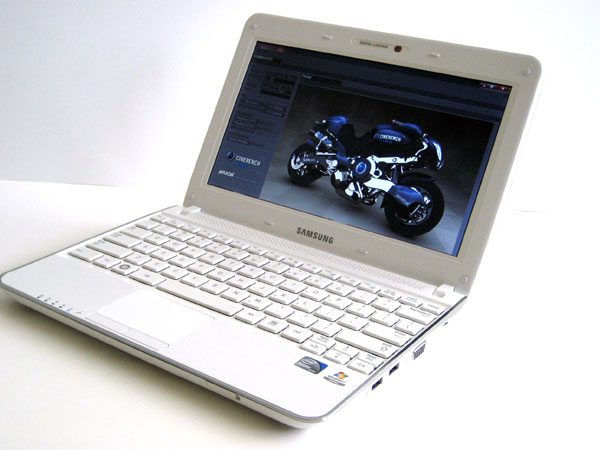
Outside of using a matte finish, though, how does the N210's screen hold up?

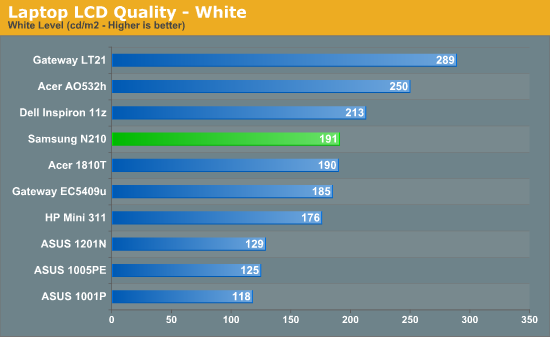
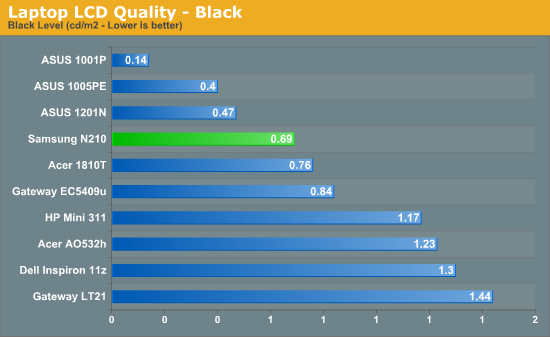
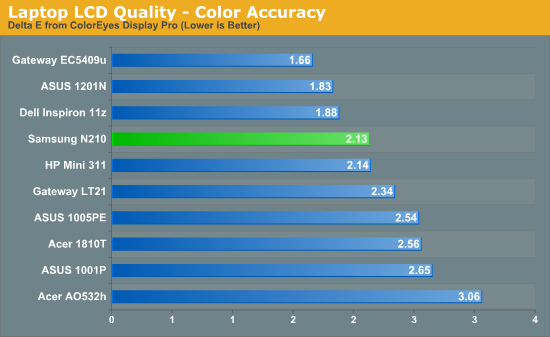
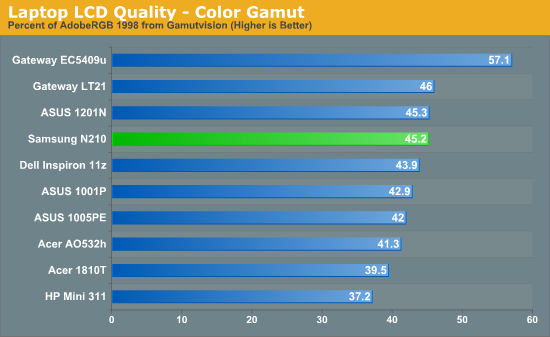
It holds up okay. The screen isn't stellar to look at and viewing angles wash out dark details in a hurry, but for basic word processing use and very occasional photo viewing, the N210's screen can get the job done. The ASUS 1001P still wins out as the highest contrast netbook LCD in recent history, with a matte surface to boot, but it also has the distinction of having the lowest maximum brightness. If you're doing a lot of outdoor work, the brighter panel in the N210 may be the way to go.










23 Comments
View All Comments
7Enigma - Thursday, July 29, 2010 - link
USB boot drive with OS on it. One of the best/fastest ways to do a clean install, especially when you don't have a built-in dvd drive. I'm probably going to do a fresh install of Win7 by the end of the year on my desktop system and even though I have the dvd my 8GB flash drive should be a much faster way and allows me to keep my dvd scratch-free.popej - Thursday, July 29, 2010 - link
I assume that non of your test shows netbook performance when running on battery? When on battery, performance could be lower to increase battery life. If you shows battery life, than would be nice to know, what kind of performance loss is included in this results.For example it could be like that:
Asus 1001p internet performance on AC: 894
Asus 1001p internet performance on battery: 720
Asus 1001p battery life internet: 455
Samsung N210 internet performance on AC: 843
Samsung N210 internet performance on battery: 840
Samsung N210 battery life internet: 354
I don't know real numbers for this netbooks, but would gladly see it in review. The way it is presented now can lead to wrong conclusions when comparing devices which use some power savings tricks.
evident - Thursday, July 29, 2010 - link
Netbooks are the biggest scam. If this was $150 or $200 it would make sense. Netbooks are almost always overpriced for what they are and everyone i've known who's bought them are always complaining about how miserable their experience is.Taft12 - Thursday, July 29, 2010 - link
They're only SUPPOSED to be $150-200.They early eeePC and other first-gen netbooks were $299 max. Intel and the hardware OEM's saw that most users could in fact get by just fine with this hardware along with Windows XP or (especially) a slimmed-down Linux distribution and got the bejeezus scared out of them. I got this information personally from someone in sales at one of the world's largest hardware resellers.
Since then, even the lowest-end models have had features and size creep up to push the price up to $300 minimum and many into $400-500 range. This is an intentional move to push down the netbook market numbers.
synaesthetic - Thursday, July 29, 2010 - link
Yeah. Intel freaked, realizing they made the Atom N270 too powerful and that's why the newer Atom development has been focused on power efficiency with a less-than-10% speed increase over previous generations.Intel did the same thing in the CULV market, too. Why do you think they killed the Celeron SU2300? It was too fast and too cheap, 90% of the much more expensive C2D SU7300 for a lot less than 90% of its price. Those Acer AS1410 with the SU2300 for $399 were an absolute steal, an amazing deal for a small computer with serious price-performance chops.
Intel didn't like that too much, though, and the new Arrandale replacement for the SU2300 isn't as good price-performance wise.
Taft12 - Thursday, July 29, 2010 - link
I'm disappointed one of the most tech-savvy hardware review sites would have a writer who thinks he is an arbiter of what is and isn't an OS worth using. MS claimed Windows 7 would be trimmed down enough to run on a netbook, but that was a half-truth at best as you have discovered. MS and Intel don't want you to have a fulfilling experience running on Atom-class hardware. The Linux community does.Your comments about unnecessary bundled software further reinforce this. We all know software company kickbacks from the likes of McAfee and Microsoft partly subsidise the cost of these devices. Most users who buy this netbook won't be capable of reinstalling a clean version of ANY OS and will be stuck running this preinstalled pig. Another reason netbook Linux distros (such as Ubuntu Netbook Remix) are the right choice for netbooks.
Dustin Sklavos - Thursday, July 29, 2010 - link
Nowhere did I use the phrase "proper OS." In fact the only place I said anything remotely close was when I mentioned that their instant-on environment didn't take the place of a full Windows installation, because it doesn't. Would you have felt better if I'd been more politically correct and just said "full operating system installation?"If you want to evangelize Linux that's your prerogative, but don't go looking for fights with us. We take our work seriously and personally I take a lot of pride in what I do here. And as a sidenote, as a writer reviewing kit for a wide audience it's basically in my job description TO be an arbiter of what works and what doesn't. If I'm not speaking from some position of authority, why should anyone listen to what I have to say?
And finally, sorry to tell you, but Linux distros presently produce substantially reduced battery life: http://techreport.com/articles.x/18883/7
The hardware is different but the results are the same. In searching online for Atom-based results I was only able to produce anecdotal evidence, but I also couldn't produce any anecdotal or academic evidence suggesting otherwise either.
Taft12 - Friday, July 30, 2010 - link
First off, thanks for replying Dustin! One of the great aspects of Anandtech and Dailytech are that the writers and editors engage the audience and you did not disappoint.I feel like I touched a nerve a bit... I'm not looking for a fight - just debate. Indeed I am a Linux evangelist, and netbooks are a great platform for spreading the word. As I pointed out, your experience running Windows 7 on this hardware was disappointing compared to desktops and laptops you are used to. This is due to 2 things:
- unlike Vista, Windows 7 will install on a netbook, but truly it doesn't really scale down enough to be usable. Better luck next time on something Windows-mobile derived?
- a fairly big problem in this industry of excessive trial software factory installed on any OEM PC
Both of these problems go away on a Linux distro intended for netbooks.
Thanks for the link. Indeed Linux generally has poorer battery life on Linux, but this is mitigated by trimming down the install and having more appropriate power settings (and even hardware-specific optimizations) in netbook distros. Note the review you linked was running the full-blown Ubuntu on an eeePC and his Linux knowledge was novice-level at best.
Finally, you most certainly did use the phrase "proper OS" (or I wouldn't have posted in the first place). I guess my whole post can be boiled down to "A full typical desktop or laptop OS install is not appropriate for these devices -- especially a crapware-laden OEM Windows install! But that doesn't mean netbooks don't have their place". Sorry for the excess wordiness :)
Even web surfing performance leaves a little something to be desired, and the fact that you can put a proper operating system on a netbook only continues the illusion that the Atom is somehow capable of doing anything other than making you wait while your program loads.
dmjazzijeff - Thursday, July 29, 2010 - link
I tried UNR (9.10 & 10.04) on my Toshiba NB205, but the number of 'issues'i had to solve in order to get it mostly working wouldn't make me think that netbooks are better suited, as a whole, than Windows XP, say. I threw an OEM install of XP Pro on it, and it works like a champ. Where the performance of OpenOffice underUNR was abysmal, Office 2003 runs like greased lightning on the thing. It even runs Office 2010 very well.I'm no MS fanboy, but putting Pro on it made me stop thinking of the Toshiba as a toy, and makes me consider it a really portable computer that's lacking a little oomph, but still has enough balls to get work done in a timely fashion. I have 2GB installed in mine, and I usually use it connected to a 22" display through the VGA port, and it works as well my older Lenovo T61 for most things that aren't CPU-bound. If I could put more than 2 GB in it, I'd consider giving Windows 7 a shot.
I'd seriously like to consider an ION2-based netbook with Windows 7, but i like the solid 8 hour battery life with the crap Intel graphics under XP so i think i'll leave well-enough alone.
I thought the Samsung and the Toshiba shared innards, but apparently not; my HD is as easy to remove as a conventional laptop (unscrew the cover for the drive bay, and swap).
stephenbrooks - Friday, July 30, 2010 - link
I'm glad I got my Samsung NC10 while they shipped with Windows XP as standard. It's a great machine (only things you can't do are demanding graphics and HD video stuff).